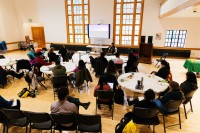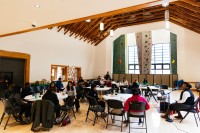Resources
Program | Flier | Slides | Bibliography
Session 1 Reflections, by Dr. Amber McZeal
The Sugar & Decoloniality 2.0 Series has begun and it was truly a delight to gather again and explore decolonial gestures that may impact change efforts in the work of health equity. Session one focused on cultivating a deeper understanding of the link between coloniality/decoloniality, slavery, capitalism, and sugar production. We explored how these perspectives may impact work within communities, specifically, how a holistic perspective on sugar saturation in processed foods may work to help depathologize those communities.
Weaving in the first event, the day began with a recap of foundational concepts. There was a review of sugar production from pre to post-colonial times which highlights the fact that human beings have had a relationship with sugar prior to colonial distortions. As we progressed through the timeline, we reviewed the philosophical roots of colonialism–called coloniality–by unpacking the colonial matrix of power. Coloniality refers to the concentration of a new model of power, culminating in a global project over the past 500 years. This new structure of power produced new social discriminations–hierarchies–which were later codified as racial & ethnic categories. This power structure–a colonial matrix of power–was and still is the framework that governs social relations, evidenced in class and racial differences.
To illuminate the thread from colonialism into modernity, we explored the two axes of coloniality–race and exploitative capitalism. Race was invented in service to expanding exploitative capitalism. It created justification for securing a free labor force, which was used to harvest sugar across the globe. Decoloniality is a gesture at restoring wholeness where relations have become splintered and placed into hierarchies. As Dr. Nelson Maldonado-Torres writes, at its root, decoloniality is a restoration of the principles of love, ethics and justice–a radical departure from the dehumanizing ethics of war & domination that pervade modernity.
The final portion of session 1 focused on identifying how coloniality resonates within contemporary sugar industry practices. We looked at how the “disease of greed” was the driving force in early sugar plantation practices, fueling the Trans Atlantic slave trade, and how this same unbridled pursuit of profit remains intact. Sugar was so profitable in the early colonial period that it was given the name White Gold. Along with Congress issuing laws to secure profit from sugar production, we also explored how the Sugar Research Foundation works to manipulate food science through lobbying efforts. The foundation’s role is to diminish the link between sugar and heart disease, and it has been quite successful.
In closing, we explored Indigenous perspectives on social and cultural phenomena through the concept of Wetiko. Wetiko is an Algonquin word for a cannibalistic spirit that is driven by greed, excess, and selfish consumption. Many scholars and cultural workers now utilize this framework to explain exploitative capitalism at the subtle, or energetic level. One of the advantages of employing this Indigenous framework is that it is rooted in a principle of wholeness–human beings who suffer from this mind virus are not discarded, and any human being is susceptible to it. Instead, through awareness, the symptom of unregulated greed may be transformed. This includes the sugar industry.
The day closed with an integration yoga session facilitated by Saeeda Hafiz. In session two, we will take a deeper dive into imaginal waters through story and art. I look forward to seeing you there!
Additional Video Resources
- Senator Cory Booker discussing the 2023 Farm Bill
- Cory Booker Leads Senate Agriculture Committee Hearing On ‘Food As Medicine’
Photography by Fox Nakai











